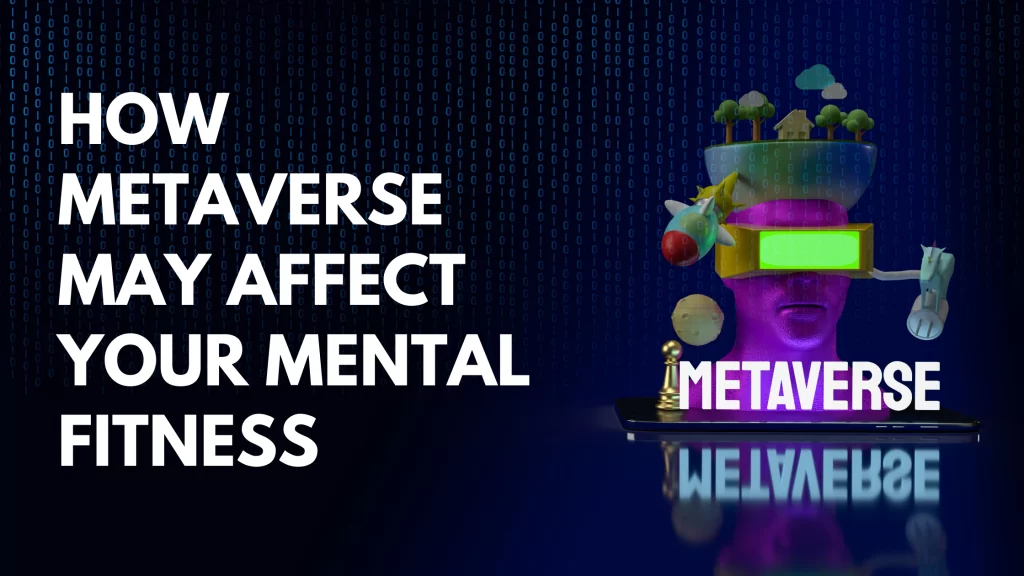Alarms have been sounded saying that the Project Metaverse could have devastating effects on people’s already worsening mental health all over the world.
Undoubtedly, the invention of the internet has brought about a revolution in every aspect of the world, and it keeps getting updated every second of every day. However, it is also a proven fact that this digital evolution has been extremely destructive to the mental health of people across the world.
It affects our relationships, lifestyles, choices, the friends we make, the food we eat, the news we see to even the clothes we wear. People are constantly seeking validation from others, which then leads to feelings of dependency and depression in them.
Studies suggest that social media has affected our psyche to the point that its absence can cause feelings of grief and unhappiness.
Additionally, with the pandemic hit world, the number of depressed people and even the suicide rate has gone up to an alarming number. The mental health infrastructure is not even close to what is required, in such a situation the last thing the world needs would be a new social media reality.
The recent announcement about the entry of Metaverse into the tech realm has brought the debate of mental health and the internet to the forefront.
What is Metaverse?
The trending word of the week courtesy of Facebook’s name change is metaverse. It is an attempt at rebranding and reselling the company which has been in hot waters due to many kinds of unethical practices and of course influencing mental health wrongly.
The actual term, Meta was given by a science fiction writer called Neil Stephenson in 1992. It was mentioned in his sci-fi novel ‘Snow Crash’.
It will essentially be an alternative virtual reality (VR) space where people will be far removed from their actual lives. You can imagine the internet having a life of its own, by turning it to 3D via the visions of a Metaverse.
It will have an n number of communities, all interwoven with each other like a virtual world.
Users will require VR headsets to operate it and enter a non-physical, physical place to meet their friends, work, etc.
Facebook and Meta
The world-renowned billionaire and creator of the social media platform, Facebook made a huge announcement recently. The company has undergone a name change to keep up with and facilitate the new direction of the future.
‘Meta’ is beginning to turn Facebook into a social technology company that will focus on creating a Metaverse for users. All the previous apps and technologies will now be under the Meta blanket.
Until now, Zuckerberg has released the company’s new name – Meta Platforms Inc. and logo.
Although the concept of this kind of alternate virtual reality has been around for quite some time now, Facebook is the only one to have acted on creating something out of it. Here are some more things you should know about it to understand its impact on the user’s mental peace:
- Users will be able to create art in the digital space and sell it.
- You will be able to attend concerts virtually.
- Visit places and take trip in the virtual universe.
- You can even buy and try clothing digitally.
- It will also help in making the office space digital, thus bring a drastic change in the work from home situation.
At the time of the launch, Zuckerberg states that this concept of the Metaverse will focus on getting people to almost teleport from one place to another without actually going anywhere.
Virtual Reality (VR)
Apart from Meta’s mental health destruction capabilities, there are also several other concerns for a project like this.
Facebook has been taken to court several times for having access to the personal data of its users. A virtual reality program could get them access to even more private data, which can, in turn, spread dangerous levels of misinformation.
Currently, the headsets itself to get a VR experience costs more than $300. This makes the technology inaccessible to a large part of the world that will not be able to afford it. Losing out on the VR world may again bring a sense of FOMO, thus increasing mental health issues all over the globe.
What do Psychologists Say?
Psychologists have stated that there are researches that will tell us the effect of a Metaverse on mental health.
A large amount of virtual interaction can prove to be very damaging for a person’s brain. It has the potential to cause tremors, hallucinations, visual or auditory delusions, etc.
Here are some of the statements issued by psychologists from all over the globe in regards to the launch of Metaverse and its impact on mental health:
- It will provide a sense of divorce from the person’s actual reality, which can cause delusions and other psychotic symptoms.
- People who are already suffering from mental health issues such as depression, anxiety etc. will seek out a match for these feelings in this new type of media.
- There are enough reasons in Zuckerberg’s prenote to be concerned right at the onset of this new metaverse.
Mental Health and The World Wide Web
There is enough evidence on the internet; specifically, social media is a toxic place to be. People are suffering from depression, anxiety, body image issues, etc. now more than ever.
Excessive use or overuse of any kind of digital technology can never be good for mental health. Some of the symptoms seen are depression in 4%, paranoid ideation in 0.5%, psychoticism in 0.5%, serious mental illnesses in 2%, and 6% of users suffer from other symptoms.
These numbers stand to increase to a very high number if Metaverse in introduced to the general public.
Meta will have to analyze these very serious repercussions of such a social technology.
Schizotypy
This is another important question in regards to the overuse of VR. Schizotypy includes a person having delusions, cognitive disorders, and distortions.
Studies suggest that people suffering from these conditions are more likely to get attracted to a game or platform like this. It is because the symptoms and traits of schizotypy become considerably lower when you are in a VR.
It also allows them to forget about the real world for a while. It can bring about greater social interaction and contact with individuals than they would in their actual lives.
If we connect this theory to the actual use of Metaverse by these individuals, then it can be considered a safe haven for them. However, a prolonged time spent in this sort of virtual universe would bring out some of the worst mental-health syndromes in the form of delusions or psychotic symptoms.
Conclusion
Facebook’s announcement of this new space in the form of Metaverse needs proper introspection. A product like this has the capability to destroy public lives if it does not undergo responsible risk tests.
If we look at the company’s underhanded past responses to accusations for accountability, we can be quite sure that this proposal will not be tested in clinical and controlled environments.
A virtual social technology such as this will only serve as a temporary distraction from mental health problems suffered by the users. It can never deliver an everlasting solution.









